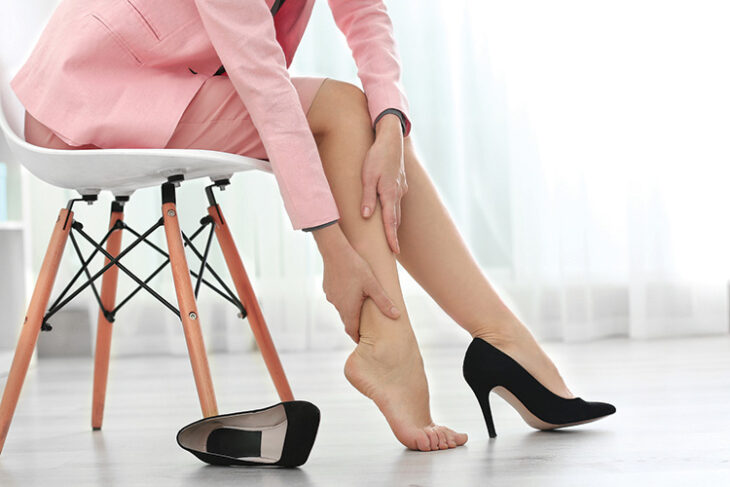By Dr. Gachavis Green

Heel pain can strike unexpectedly, turning a simple walk into an uncomfortable challenge. If you’ve recently experienced a jolt of pain in your heel, you’re not alone. This common issue affects more than 2 million Americans every year, but understanding its potential causes and treatment options can lead you back to comfort.
WHAT TYPICALLY CAUSES HEEL PAIN?
Heel pain can be caused by a variety of different conditions, but most heel pain comes down to overuse — simply being on your feet for too long. Your heel also may become swollen or painful for any of the following reasons:
- Shoes with poor support
- Running on hard surfaces
- Running too often
- Tightness in your calf muscles
- Landing hard on your heel while walking or running
WHICH CONDITIONS CAUSE HEEL PAIN?
- Achilles tendinitis: This condition is caused by overuse of the Achilles tendon, the band of tissue that connects your calf muscles at the back of the lower leg to your heel bone.
- Heel bursitis: Inflammation of the bursa, a small fluid-filled sac at the back of the heel, can cause pain and swelling.
- Plantar fasciitis: This is the most common cause of heel pain. It occurs when the plantar fascia, the ligament connecting your heel to the front of your foot, becomes strained. This can lead to pain and stiffness in the heel area.
- Heel spurs: These are abnormal growths of bone on the bottom of your heel, often developing alongside plantar fasciitis.
- Stress fracture: High-impact activities like running or jumping can sometimes cause a stress fracture in the heel.
WHAT ARE SOME TREATMENT OPTIONS FOR HEEL PAIN?
- Rest and ice: Give your feet a break. Reducing activities that put stress on your heel, combined with applying ice, can reduce inflammation and pain.
- Proper footwear: Wear shoes that provide good arch support and a cushioned sole. Avoid walking barefoot on hard surfaces.
- Exercises and stretches: Stretching exercises for the Achilles tendon and plantar fascia can help relieve pain and improve flexibility.
- Over-the-counter pain relief: Nonsteroidal anti-inflammatory drugs (NSAIDs), like ibuprofen, can reduce pain and inflammation.
- Orthotic devices: Custom or over-the-counter orthotics can provide extra cushioning and support for your heel.
- Physical therapy: A physical therapist can teach you exercises to strengthen your lower leg muscles, which helps stabilize your walk and lessen the workload on your heel.
Remember, if you’re experiencing sudden heel pain, it’s important not to ignore it. Your feet are essential to your overall health and wellbeing. Stay in tune with your body, and don’t hesitate to seek professional medical advice for persistent pain.
Dr. GaChavis Green is a board-certified podiatrist at Ochsner Health in Gulfport. He performs podiatric medicine and surgery and has a special clinical interest in wound care. To schedule an appointment, visit Ochsner.org/schedule.


